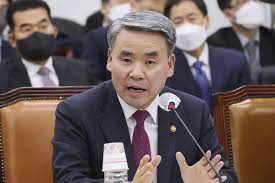SEOUL, South Korea (AP): South Korea’s defense minister on Friday insisted the country’s soldiers didn’t commit any massacres during the Vietnam War and indicated the government will appeal a ruling that ordered compensation for a Vietnamese woman who lost several relatives to a shooting rampage blamed on South Korean marines in 1968.
When asked about last week’s ruling by the Seoul Central District Court, South Korean Defense Minister Lee Jong-Sup told a parliamentary committee that his ministry is certain there were “absolutely no massacres committed by our troops” during the Vietnam War.
“We cannot agree with the ruling … We will hold discussions with related agencies to determine our next legal step,” Lee said.
The court ordered the government to pay 30 million won ($23,000) to 62-year-old Nguyen Thi Thanh, who survived a gunshot wound but lost five family members — including her mother and two siblings — after South Korean marines swept through her village of Phong Nhi in central Vietnam on Feb. 12, 1968.
According to U.S. military documents and survivors, more than 70 people were killed that day when South Korean marines allegedly fired at unarmed civilians while occupying Phong Nhi and nearby Phong Nhut. The action came after at least one South Korean soldier got struck and injured by nearby enemy fire.
Last week’s ruling marked the first time a South Korean court has found the government responsible for mass killings of Vietnamese civilians during the war and could potentially open the way for similar lawsuits. South Korea, then ruled by anti-communist military leaders, sent more than 320,000 troops to Vietnam, the largest foreign contingent fighting alongside U.S. troops.
While some activists claim South Korean troops were responsible for the massacres of possibly thousands of civilians during the Vietnam War, those atrocities haven’t meaningfully impacted relations with Vietnam, whose growing economy is heavily dependent on South Korean investment.
In awarding the compensation to Thanh, the court dismissed the government’s claims that there was no conclusive evidence that South Korean troops were responsible for the killings. The government’s lawyers had even suggested that the aggressors may have been Vietcong fighters disguised in South Korean uniforms who were attempting psychological warfare.
The government’s lawyers were also unsuccessful in arguing that civilian killings were unavoidable because the South Korean troops were dealing with Vietcong guerrillas who often blended with villagers.
Lee repeated those government arguments during Friday’s parliamentary session, saying that the situation at the time was “very complicated.”
“There were a lot of cases where those wearing South Korean military uniforms weren’t (South Korean troops),” Lee said, claiming that the ruling damages the honor of South Korean troops.
Thanh’s lawyers had claimed there was no way to justify the killings when South Korean veterans who spoke about the shootings said they didn’t face any meaningful resistance or aggression from villagers, who were rounded up and shot from close range.
Lee claimed that a U.S. military investigation into the incident found that South Korean troops did not commit civilian massacres in the villages, although the actual U.S. documents submitted as evidence in Thanh’s case show that no definite conclusion was reached in the face of South Korean denials.
According to investigation records, U.S. Marines and South Vietnamese militia provided medical treatment to villagers who fled as South Korean soldiers allegedly continued shooting inside the villages. U.S. Marines later entered the villages and found piles of bodies in different areas, many burned or buried in ash. One U.S. soldier took photos that were used as evidence during Thanh’s trial.
When pressed by a liberal opposition lawmaker on his broader knowledge of war crimes during the Vietnam War, Lee insisted he didn’t know much about the massacre of My Lai. Hundreds of unarmed villagers were killed there during an aggressive sweep by U.S. troops in March 1968, in what is widely seen as the most notorious episode in modern U.S. military history.
Han Kiho, a lawmaker in the ruling conservative party who chairs the National Assembly’s national defense committee, came to Lee’s support, urging the government to appeal the ruling in Thanh’s case, which he claimed was based on weak evidence.
“South Korea’s dispatching of troops to the Vietnam War was an inescapable choice at the time to fight against communists,” said Han, a former three-star army general. “The Defense Ministry and other government authorities should commit to finding the clear truth so that any attempt to disparage the honor of Vietnam War veterans would be sternly rejected.”
Lim Jae-sung, one of Thanh’s attorneys, said Lee was ignoring firmly established facts and evidence that were upheld in court.
“Also, the trial was about a single incident and it’s not right to use the evidence and testimonies presented during the case to insist with certainty that there were no civilian massacres (committed by South Korean troops) at all,” Lim said.
The Justice Ministry, which represents the government in lawsuits, said it would closely examine the ruling and discuss it with related agencies, including the Defense Ministry, before determining whether to appeal. The government must appeal within two weeks of formally receiving a copy of the ruling, which according to Thanh’s lawyers was delivered on Friday.







